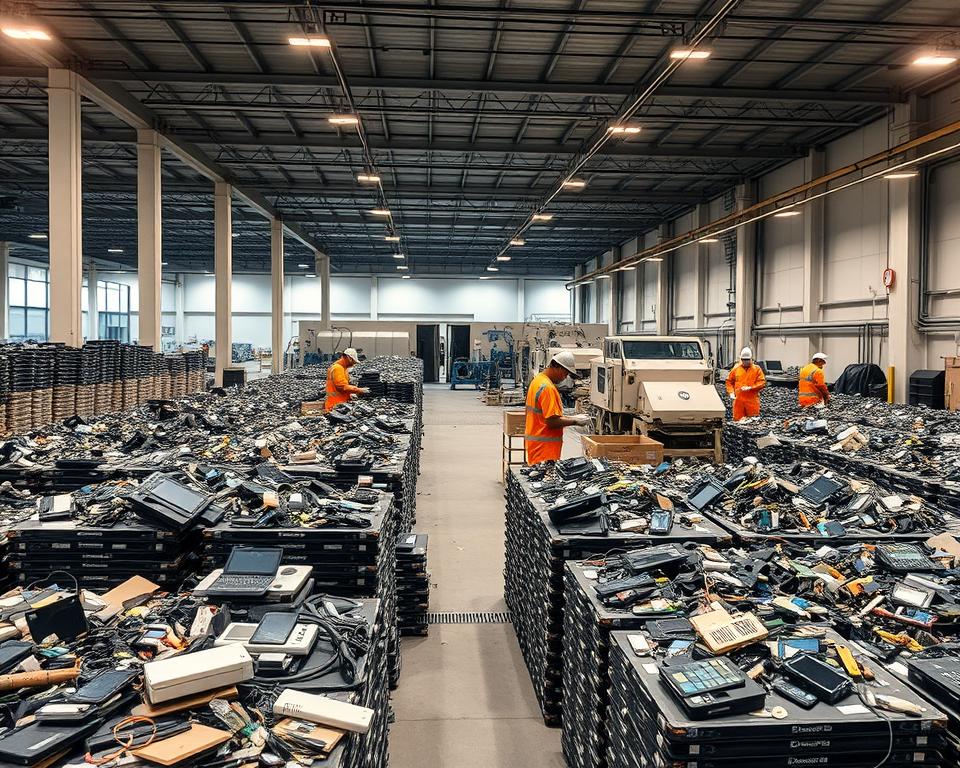Singapore eWaste Disposal Services – Eco-Friendly
Can tossing an old laptop into the bin really harm Singapore’s environment more than you think?
This article introduces environmentally responsible e-waste disposal services and practical e-waste recycling options across Singapore. We explain how homes and companies can leverage public collection points, brand take-back programs, and NEA-licensed providers like Advance Recycling for NEA-compliant , secure https://www.advance-recycling.com/e-waste/ disposal.
You’ll learn about national regulations, the Extended Producer Responsibility (EPR) context, and what to expect from sustainable electronic waste solutions. You will also learn how licensed management, clear documentation, and secure data destruction protect both the environment and your information.
Whether you need eco-friendly disposal options for a single phone or complete corporate IT asset disposition, this guide outlines clear, compliant steps to recycle the right way and recover high-value materials while cutting landfill use and pollution.

Quick Highlights
- NEA-aligned, certified recycling is the core focus in Singapore’s e-waste services.
- Advance Recycling stands out as an NEA-licensed provider offering secure, eco-friendly disposal.
- Residents use public drop-offs, while businesses get scheduled pickups and data destruction.
- Sustainable solutions recover metals and curb landfill pollution.
- Knowing EPR and compliance criteria helps you select the right service.
Overview of eWaste Disposal Services in Singapore
Electronic waste covers a wide range of devices—from consumer gadgets to enterprise IT. This includes laptops, mobile phones, tablets, monitors, and printers. It also covers servers, switches, networking gear, small household appliances, audio systems, power supplies, batteries, and lamps.
Homes and businesses must understand what counts as e-waste. Devices that are functional can be donated or sold at designated centres. On the other hand, items that are broken or nearing the end of their life must be sent to approved facilities for safe disposal under certified ewaste management.
E-waste handling is governed by national rules and the EPR scheme
The National Environment Agency (NEA) is responsible for overseeing ewaste disposal services. It sets standards for collectors and processors. EPR assigns obligations to producers. It mandates the use of authorised operators for managing take-back and recycling initiatives.
Programmes like ALBA E-waste Smart Recycling and manufacturer take-back schemes operate within the EPR framework. These programs provide regulated collection and processing. Public drop-off points and online tools help residents locate local recycling options for electronic waste.
Certified recyclers connect regulation to day-to-day practice
NEA-licensed firms like Advance Recycling provide secure, traceable e-waste handling. They work with EPR operators and public programmes to ensure compliance with NEA standards for certified ewaste management.
Businesses benefit from certified providers that document disposal and recover metals responsibly. Robust e-waste services are vital for Singapore to reach circular economy goals. They protect both public health and the environment.
| Service Element | What You Get | Why It Matters |
|---|---|---|
| Collection | Drop-offs, scheduled pickups, community drives | Convenience raises participation in electronic waste recycling |
| Oversight | NEA licensing, EPR-aligned authorised operators | Ensures legal compliance and traceable processing |
| Processing Standards | Secure sites; sorting; recovery; hazardous handling | Worker safety, pollution prevention, value recovery |
| Docs | Recycling certificates, manifests, EPR reports | Complete audit trail for stakeholders |
| Data Protection | Wiping, degaussing, physical shredding as needed | Reduces data breach risk when disposing devices |
Benefits of Choosing Eco-Friendly Electronic Waste Recycling
Choosing certified e-waste services offers clear environmental benefits. It reduces landfill volume and keeps harmful substances like lead, mercury, and cadmium out of our soil and water. As a result, pollution risks fall and battery-related fire hazards diminish.
Environmental benefits ewaste disposal services include less contamination and safer neighborhoods. Sustainable electronic waste solutions prevent toxins from entering our food chains. That protects public health and conserves local ecosystems in Singapore.
Professional recyclers prioritise material recovery. They extract valuable materials like copper, aluminum, gold, and rare earths through proven methods. These materials are then returned to manufacturing streams, reducing the demand for virgin mining and saving energy.
The table below outlines common recoveries and supply chain impacts.
| Recovered Material | Source Device | Supply Chain Benefit |
|---|---|---|
| Copper | PSUs, cables | Reduces need for new mining, lowers production emissions |
| Aluminium | Casings, heat sinks | Enables lightweight builds; reduces energy use |
| Au | PCBs, connectors | High-value reuse; reduced environmental impact |
| REEs | Speakers, magnets, sensors | Maintains critical supply for tech, reduces import pressure |
Businesses gain reputational and regulatory advantages by adopting green technology recycling. Certified partners help satisfy NEA rules and EPR obligations. Firms show corporate responsibility through transparent recycling records and certificates.
Community programs and brand take-backs raise engagement. They make sustainable electronic waste solutions more accessible and build trust with customers. Local involvement strengthens brands and supports long-term environmental goals.
Choosing certified services keeps resources traceable and in circular supply chains. This practice supports industry-wide shifts toward eco-friendly disposal options and sustains material value for future products.
How Pro e-Waste Services Operate
Pro collection services begin with clear hand-in options. Households can drop off items at e-waste bins, manned counters in stores, or depot drop-offs. Community drives and brand take-back events add convenient local choices.
Businesses follow tailored routes. Companies can schedule regular collections or book doorstep pickup ewaste disposal services for one-off clearouts. For major IT moves and office retirements, booked pickups maintain timelines and minimise disruption.
Secure data handling is a key step. Certified recyclers apply layered controls to protect sensitive data. Typical methods: wiping reusable drives, degaussing magnetic media, and shredding SSDs/HDDs when necessary.
Facilities reinforce these methods with physical security. Centres often use 24/7 CCTV, intrusion alarms, and access control to maintain chain-of-custody. Clients may request destruction certificates to satisfy audits and data-security standards.
Collected items travel via sealed transport to NEA-licensed plants. At these sites, staff sort electronics into streams: IT equipment, batteries, lamps, and hazardous components. Correct separation cuts contamination and improves recovery.
Licensed processors follow regulated workflows. They remove hazardous parts, harvest reusable components, and route remaining materials to approved recycling lines. Transparent handling and certification provide compliance records for corporate clients during audits.
Certified eWaste Management: What to Look For
When choosing a recycler, verify credentials, security, and proof of processing. Opt for companies that display their licenses, processes, and reports clearly. This reduces legal risk and supports corporate sustainability goals.
NEA Licensing & EPR Compliance
Confirm the recycler holds a valid NEA license. They should handle regulated consumer and ICT products under EPR. A valid license confirms adherence to national standards for collection, transportation, and processing. Ask whether they work with authorised EPR operators as needed.
Third-party certifications and secure facilities
Seek independent certifications and documented security protocols. Expect 24/7 CCTV, intrusion detection, and access-controlled zones. Secure destruction areas and monitored shredding lines safeguard data-bearing devices. These measures are critical to prevent diversion and data breaches.
Transparent Reporting & Certificates
Request detailed manifests, recycling logs, and formal certificates of destruction for each shipment. Transparent reporting and chain-of-custody build trust with auditors and stakeholders. Certified firms provide detailed reports that confirm devices were processed securely and materials were recovered responsibly.
Choose partners offering NEA-licensed recycling, verifiable credentials, and transparent reporting. This approach enhances compliance, safeguards sensitive information, and supports long-term sustainability goals.
Pricing and When e-Waste Disposal Is Free or Charged
Understanding ewaste disposal services pricing is essential for both households and businesses. Public and EPR programs often accept small items for free. However, bulk volumes and specialised items may attract fees from professional firms.
Free options for households
Many neighbourhood collection points, mall drop-offs, and town council drives offer free e-waste disposal for household-sized quantities. Brands like Samsung and Apple host take-back events for certain consumer devices under approved schemes. Eligibility can vary by operator and item type, so it’s important to check before bringing materials.
When charged ewaste collection services apply
Bulk clear-outs, corporate asset retirements, and large appliances typically fall under charged ewaste collection services. Licensed recyclers (e.g., Advance Recycling) quote for transport, labour, and NEA-compliant processing. Examples include servers, refrigeration units, and industrial equipment.
Cost drivers to expect
Several factors can increase the cost of electronic waste recycling. Data destruction (wiping, degaussing, shredding) increases fees. Doorstep pickups and scheduled runs add logistics charges. Handling hazardous items like lithium batteries and fluorescent lamps requires special procedures, further increasing costs.
| Offering | Typical Range (SGD) | Notes |
|---|---|---|
| Household drop-off for small devices | $0 | Public collection points, manufacturer take-back for eligible items |
| Single-item doorstep pickup | 10–50 | Varies by distance and device; basic transport included |
| Corporate bulk collections | 200–2,000+ | Job-quoted; includes logistics and processing |
| Secure data destruction (per device) | 15–150 | Wiping/degaussing/shredding with certificate increases cost |
| Hazard handling | 20–500 | Special treatment/permits for batteries, lamps, refrigerants |
| Certificate of destruction or recycling | Included–100 | Transparent providers state if certificate is included |
How to get clear pricing
Ask NEA-licensed recyclers for itemised quotes. Quotes should list all included services. Compare options and confirm whether household items qualify for free disposal before booking.
Responsible ewaste removal for Businesses and Households
Residents and companies should follow clear steps to keep e-waste out of landfill and reduce hazards. Start with a plan that covers inventory, secure handling, and proper handover to licensed processors. This supports compliance and protects data and people during transport and recycling.
Adopt a formal IT asset disposition program that logs equipment from decommissioning to final disposal. Include inventory logs, chain-of-custody, and certificates from NEA-licensed recyclers. Use certified destruction/refurbishment to meet audit and sustainability reporting.
Enforce data sanitization policies such as secure wiping, degaussing, or physical destruction for drives. Work with providers who offer verifiable reports and secure transport to prevent loss or misuse of corporate information.
Household Options: Collection Points & Brand Take-Back
Residents have several household e-waste options. Drop off small electronics at community collection points, in-store counters, or public depots. Many brands provide manufacturer take-back schemes that accept end-of-life devices for recycling or refurbishment.
When possible, donate working devices to schools or charities. If beyond reuse, use authorised programs (e.g., ALBA) or industry take-backs to ensure proper processing.
Preparing devices: data backup, battery safety (tape ends), and removal of consumables
Back up important files and wipe data securely if required. Remove memory cards and SIM cards and reset devices to factory settings if possible. Label items that hold sensitive components.
Handle batteries with care. Tape terminals/exposed wires and isolate any leaking batteries in a leak-proof container. Remove consumables such as ink cartridges when recyclers request this step.
Following these preparation steps ensures safe transport, lowers fire risk, and helps licensed processors comply with regulations during recycling or certified destruction.
Range of Items Accepted by Electronic Waste Collection Services
In Singapore, electronic waste collection services accept a broad range of devices. Both consumer and enterprise items are covered. Drop-off points and scheduled pickups clearly list what’s accepted. This makes it easier for households and IT teams to plan their removals efficiently.
Common consumer devices
Programmes typically accept laptops, mobile phones, tablets, desktop PCs, monitors, and printers. Peripherals like scanners, keyboards, and mice are included. Before bringing older monitors, check for CRT restrictions at specific sites.
Specialised IT equipment
Corporate collections cover servers, storage units, switches, and routers. These items often require scheduled pickups and secure processing due to data risks and size. Providers of IT equipment recycling log asset details and can issue certificates upon completion.
Batteries, lamps and small household electronics
Batteries and lamps require special handling. Use dedicated or combined battery bins when available. Do not put batteries in general recycling carts. Tape rechargeable terminals and isolate any leaking cells in a leak-proof container.
Small electronics like gaming consoles, audio systems, and power adapters are commonly accepted. Always confirm accepted items to avoid rejection.
Some sites accept only ICT, batteries, and lamps; others accept all regulated consumer electronics. Office managers should ask about fees for bulk or specialised disposals. Also, ask if IT equipment recycling includes data sanitisation.
Green Tech Recycling & Sustainable e-Waste Solutions
Singapore’s push for greener lifecycles boosts demand for green tech recycling and sustainable e-waste solutions. Certified processors use tailored workflows to keep hazardous materials out of landfill. They maximize reuse and recovery in the process.
It starts with safe collection and separation. Teams sort by device type and isolate hazardous components (batteries, lamps) for dedicated treatment. After that, mechanical separation and controlled shredding free metals and plastics for refining.
Techniques for material recovery and safe processing
Shredding, eddy current separation, and density sorting are used to recover copper, aluminum, and mixed plastics. Refined metallurgical steps then extract gold, silver, and palladium for reuse in new assemblies. Hazardous streams are sent to licensed treatment plants, adhering to NEA and EPR standards.
Advance Recycling and similar certified firms document every step. They issue manifests and recycling receipts that verify the chain of custody and support corporate reporting obligations.
Circular Solutions: Refurbishment, Resale & Parts Harvesting
Extending product lifecycles cuts demand for new materials. Working laptops/phones are refurbished for resale or donation. Nonworking units are harvested for working components like screens, memory modules, and power supplies.
Parts harvesting supports local repair shops and reduces pressure on raw material supplies. This creates a resale market that aligns with circular electronics goals and lowers the carbon footprint of consumer electronics.
Partnerships with manufacturers and EPR operators to close the loop
Recyclers work with manufacturers and EPR operators (e.g., ALBA, KGS) to run take-backs and dealer networks. Partnerships route recovered metals and refurbished units back into supply chains.
Material-recovery services often integrate with OEM repair programs. This ensures valuable fractions flow back to OEMs for remanufacture or component reuse, strengthening circular electronics systems.
| Stage | Purpose | Benefit |
|---|---|---|
| Collection & Sorting | Separate streams by material and hazard | Safer handling and higher recovery |
| Mechanical Steps | Shredding; eddy-current; density sorting | Efficient metal/plastic extraction |
| Metallurgical Refining | Recover base and precious metals | Feeds supply chains, reduces mining demand |
| Refurb/Repair | Test, repair, and certify working units | Extends life; supports resale markets |
| Component Harvesting | Salvage usable components | Lower repair costs, reduce waste |
| EPR Partnerships | Take-back, collection networks, material return | Closes loop between consumers and manufacturers |
Choosing verified providers supports sustainable electronic waste solutions that align with Singapore’s EPR goals. Material recovery ewaste disposal services and promoting circular electronics reduce environmental harm while creating economic value.
Why Choose Advance Recycling for Professional e-Waste Disposal
Choosing the right partner for electronic waste collection is critical for both homes and businesses. A reliable provider helps reduce environmental damage, protects sensitive data, and streamlines logistics. Advance Recycling meets these needs and stands out as a strong option.
Advance Recycling adheres to NEA-aligned practices and operates within the EPR framework. They accept ICT equipment, batteries, lamps, and consumer electronics. A focus on recovery and responsible processing reduces landfill and pollution.
Data security remains a top corporate priority. Advance Recycling offers data wiping, degaussing, and physical shredding for storage devices. Their facilities employ CCTV and access control to safeguard data integrity and provide certificates of destruction or recycling upon request.
Service convenience is another key aspect. Clients can use designated drop-off points, schedule corporate pickups, book doorstep collection, or participate in community drives. These choices make certified management accessible to all needs.
Transparent reporting is essential for businesses. They provide manifests and certificates covering handling, transport, and final processing. This transparency builds trust in electronic waste collection services.
| Service Feature | Household Benefit | Business Benefit |
|---|---|---|
| Designated drop-off points | Local, easy access for small items | Convenient for staff donations and local collections |
| Scheduled Pickups | Doorstep removal for bulky items | Coordinated retirements with minimal downtime |
| Data destruction services | Peace of mind for personal data | Certified destruction and audit-ready documentation |
| NEA-Aligned Processing | Assurance of safe downstream handling | Regulatory/EPR compliance |
| Community Drives | Accessible events and outreach | CSR opportunities and bulk collection options |
Advance Recycling combines responsibility, security, and convenience. Their approach supports certified ewaste management for both Singapore households and corporate clients seeking reliable electronic waste collection services.
Conclusion
NEA-licensed providers are key to responsible e-waste removal in Singapore. Certified ewaste management ensures devices, batteries, and hazardous components are handled safely. This process is documented, with recycling or destruction options available. It protects the environment, reduces pollution, and enables resource recovery through sustainable electronic waste solutions.
Households can use public drop-off points and manufacturer take-back programmes for small items and batteries. Businesses should adopt formal ITAD practices. Work with professional vendors for secure wiping, degaussing, or physical destruction. This approach provides transparent certificates and reporting.
For reliable, eco-friendly outcomes, select a professional ewaste disposal services partner that aligns with NEA rules. Advance Recycling offers NEA-aligned processes, secure data handling, and convenient collection options. They help close the loop on e-waste, supporting Singapore’s shift to sustainable electronic waste solutions.

